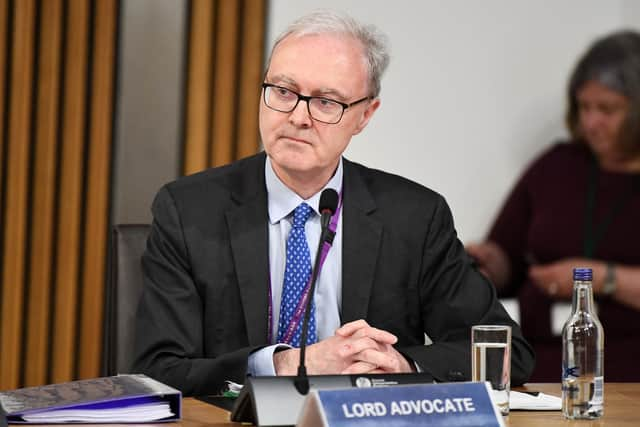Scotland's Lord Advocate: Perception of conflicts of interest is reason alone for reform – Martyn McLaughlin
They will face some seismic decisions about prosecutions in the wake of the pandemic, and can look forward to advising the Scottish government on whether its planned independence referendum bill falls within Holyrood’s competency. Whatever they decide, they can expect pelters. It is not a job for the faint of heart.
Thanks to the parliamentary committee investigation into the Scottish government’s mishandling of complaints against Alex Salmond, the ancient office has been thrown under the spotlight like never before, and longstanding tensions have been exacerbated. The question many are now asking is not who will step into Mr Wolffe’s shoes, but whether the very office of the Lord Advocate should be shaken up.
Advertisement
Hide AdAdvertisement
Hide AdThe duality of the position has been one of the problematic quirks of Scotland’s devolution settlement. The Lord Advocate is at once the head of the Crown Office and Procurator Fiscal Service, and a minister and principal legal advisor to the Scottish government.
The flashpoints arising from this dichotomy over the years are too numerous to mention. It cast a shadow over the Lockerbie bombing trial, and in the aftermath of the Shirley McKie case, it prompted misgivings over whether there was too little separation between Scotland’s law officers and its politicians.
Many of those who condemned Mr Wolffe in the wake of the Salmond case had their own agendas in play and chose their remarks carelessly. But the optics of that affair intensified concerns about the multiple hats worn by the Lord Advocate.
The clamour for reform cannot simply be addressed with a new appointment and fresh pledges of independence and integrity. The SNP’s manifesto promised to consult on whether the dual functions of the Lord Advocate and Solicitor General should be separated over the next Holyrood term. Now is as good a time as any for that work to begin.


Every institution must evolve to better represent and serve the public good, but there is a growing consensus in the Scottish legal establishment that the office of the Lord Advocate is mired in stasis.
A survey of lawyers undertaken in March by the Scottish Legal News found that 81 per cent of those questioned wished to see reform, with just 12 per cent in favour of the status quo. Some seven per cent of respondents opted for the middle ground, choosing to maintain the dual role, but impose limits on its powers.
It is not for me to guess at the reasons for such an overwhelming majority, but if there is a perception that a problem exists, particularly with a role as sensitive as that of the Lord Advocate, then that in itself is problematic.
It should be noted that the numerous controversies which have engulfed Mr Wolffe of late were not of his own making. It was the Scottish government which chose to defend its doomed judicial review against Mr Salmond, despite counsel warning ministers of the harm in doing so.
Advertisement
Hide AdAdvertisement
Hide AdSimilarly, the much-maligned prosecution of the former administrators of Rangers Football Club was undertaken before Mr Wolffe took up office. He may have apologised for it, and initiated a judge-led review, but it was Frank Mulholland who was Scotland’s top law officer when the indictments were issued.
The accusations that Mr Wolffe carried responsibility for these decisions is misplaced, and a good deal of the criticism to that effect has been deliberately and recklessly misleading.
He is, at least, in good company. Previous Lord Advocates have been forced to deal with doubts about their suitability for the role. This was certainly true of Dame Elish Angiolini, who became the first woman to take up the office having spent a long and distinguished career in the Crown Office and Procurator Fiscal Service (COPFS).
That prosecutorial background did not prevent her from upholding the independence of her new role, but neither did it prevent questions being asked about whether she had the breadth and strength of experience to empower her to do so.
Which brings us to the wider dilemma facing the office Mr Wolffe intends to vacate. Even if the condemnation that has come his way in recent months has been contrived, the sheer volume of it risks undermining the public’s confidence in what is a fundamentally important position in Scottish public life.
Its very purpose is to stand as the guardian of the public interest, and even if those who hold the position act with integrity, the persistent doubts aired over their loyalties cannot be ignored indefinitely. There is no ideal time to right that oversight, but the transition from one Lord Advocate to another seems an opportune moment.
In doing so, it is important to scrutinise any new arrangements that are proposed. Would, for instance, the reworking of the Lord Advocate into a Attorney General-like figure risk increasing the politicisation of the role instead of mitigating such concerns?
Even if that hurdle is overcome, what arrangements will be put in place to ensure the Lord Advocate is accountable if they are no longer required to appear before parliament?
Advertisement
Hide AdAdvertisement
Hide AdAnd if there is to be a director of public prosecutions in Scotland, would that diminish the protection the COPFS is afforded at present by virtue of the Lord Advocate’s ministerial position?
These are not questions which can be resolved easily, which is all the more reason to subject them to a thorough examination. We are dealing with a unique constitutional role which dates back centuries. If there is to be change, it must be carefully considered.
